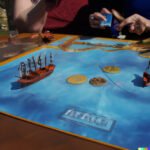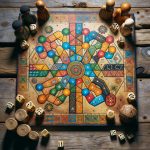Old simple strategy board games have stood the test of time, captivating players for centuries with their engaging gameplay and timeless appeal. From traditional classics like chess and checkers to lesser-known gems like Othello and backgammon, these games offer a blend of skill, strategy, and friendly competition that continues to captivate players of all ages. In this article, we will delve into the world of old simple strategy board games, exploring their rich history, gameplay, benefits, and enduring popularity.
As we trace the origins of classic games like chess and checkers, we gain insight into the cultural significance and evolution of these beloved pastimes. Understanding the historical context in which these games emerged enhances our appreciation for their enduring appeal and strategic depth. Additionally, analyzing the rules and tactics of popular games such as Othello and backgammon provides valuable insights into the varied approaches and challenges present in these traditional titles.
Furthermore, we will explore the cognitive and social benefits of playing old simple strategy board games. From honing critical thinking skills to fostering meaningful social interactions, these games offer a range of advantages that contribute to both personal growth and community engagement. By highlighting the top old simple strategy board games – including Go and Mancala – we aim to showcase the enduring popularity and impact of these classic titles on players around the world.
History of Old Simple Strategy Board Games
Old Simple Strategy Board Games have a rich and storied history, with some of the most enduring games tracing their origins back centuries. Chess, for example, is believed to have originated in India around the 6th century AD, before spreading to Persia and eventually making its way to Europe.
The game of checkers, on the other hand, has been traced back to ancient Egypt and has been played in various forms throughout history. These classic games have stood the test of time and continue to be beloved by players of all ages.
One of the defining features of old simple strategy board games is their ability to transcend cultural and geographical boundaries. Games like Mancala have been played for centuries across Africa, Asia, and the Middle East, with numerous variations reflecting the diverse traditions and customs of different regions. Similarly, Go-a game that originated in China over 2,500 years ago-has gained popularity around the world for its deep complexity and strategic depth.
The enduring appeal of these games lies in their simplicity and elegance. Despite being centuries old, these games continue to capture the imagination of players and remain popular in a high-tech world. Whether it’s the intellectual challenge of chess or the tactical maneuvering in Othello, old simple strategy board games offer a timeless form of entertainment that has endured for generations.
| Classic Game | Origin |
|---|---|
| Chess | India (6th century AD) |
| Checkers | Ancient Egypt |
| Mancala | Africa/Asia/Middle East |
| Go |
The Gameplay of Old Simple Strategy Board Games
Old simple strategy board games have been a source of entertainment and mental challenge for centuries. These timeless classics continue to captivate players of all ages, providing a welcome break from the digital world. In this section, we will delve into the gameplay of some popular old simple strategy board games, specifically Othello and Backgammon.
Othello
Othello, also known as Reversi, is a two-player game that involves a grid board and pairs of distinct pieces (commonly black and white). The objective of the game is to have the majority of your colored discs showing at the end of the game.
Players take turns placing discs on the board with their assigned color facing up. During a play, any discs of the opponent’s color that are in a straight line and bounded by the disc just placed and another disc of player’s color are turned over to become player’s color.
Backgammon
Backgammon is one of the oldest known board games. It is a two player game where each player has fifteen pieces (checkers) that move between twenty-four triangles (points) according to the roll of two dice. The objective is to be the first to bear off all your checkers or move them off before your opponent does. The gameplay involves a combination of strategy and luck, making it an engaging and dynamic game.
Engaging in these classic games offers numerous benefits ranging from improved cognitive function to enhanced social interaction. The rules may be simple, but mastering these games requires strategic thinking and careful planning. Whether it’s Othello or Backgammon, fans of old simple strategy board games can attest to their enduring appeal and timeless charm.
Benefits of Playing Old Simple Strategy Board Games
Old simple strategy board games have been entertaining people for centuries, offering not only leisure but also numerous benefits that contribute to cognitive and social development. Engaging in these traditional games such as chess, checkers, Othello, and backgammon can have a positive impact on the mind and overall well-being of the players.
One of the key benefits of playing old simple strategy board games is the improvement of cognitive skills. These games require critical thinking, problem-solving, and decision-making abilities. For instance, chess involves planning several moves ahead while considering multiple scenarios. This mental exercise has been proven to enhance concentration, memory, and strategic thinking in players of all ages.
Furthermore, these traditional board games facilitate social interaction and bonding among individuals. Whether it’s friendly competition or a casual game night with family and friends, playing old simple strategy board games promotes communication, sportsmanship, and teamwork. It fosters meaningful connections and creates shared experiences that contribute to overall happiness and well-being.
Moreover, research has shown that regular engagement in these classic games can lead to reduced stress levels and improved mental wellness. The sense of accomplishment from mastering a game or winning a challenging match releases dopamine in the brain, generating feelings of satisfaction and boosting mood. Overall, playing old simple strategy board games is not just a recreational activity but also a valuable means of enhancing cognitive abilities and fostering social connections.
| Benefits | Advantages |
|---|---|
| Improved Cognitive Skills | Enhances critical thinking, problem-solving abilities, concentration |
| Social Interaction & Bonding | Promotes communication, sportsmanship, teamwork |
| Mental Wellness | Reduces stress levels, improves mood and mental well-being |
Top Old Simple Strategy Board Games
When it comes to old simple strategy board games, there are a few timeless classics that have stood the test of time and continue to be beloved by players around the world. These games not only provide hours of entertainment, but also offer opportunities for skill development and strategic thinking. Some of the most enduring games in this category include Go and Mancala, which have been enjoyed for centuries.
Go: A Game of Strategy and Patience
Go is an ancient Chinese board game that dates back over 2,500 years. It is a game of strategy and patience, where players compete to control territory on a gridded board using black and white stones. The simplicity of the rules belies the depth and complexity of the gameplay, making it a favorite among strategy game enthusiasts. Go has been popular not only in China, but also in Korea and Japan, with dedicated professional leagues and tournaments.
Mancala: A Game of Skill and Calculation
Mancala is another classic old simple strategy board game that has been played for centuries across Africa, Asia, the Middle East, and the Caribbean. The game involves capturing your opponent’s pieces through calculated moves around a board with hollows or pits. Mancala requires skillful planning and calculated risk-taking to outmaneuver opponents and claim victory. Its roots as an ancient counting game make it an enduring favorite among players seeking a challenge.
These two games are just a glimpse into the rich history of old simple strategy board games that have captivated players throughout the ages. Their enduring appeal lies in their ability to challenge players’ minds while providing endless hours of enjoyment. Whether you’re drawn to the deep strategic thinking required in Go or the skillful calculation needed for Mancala, these classic games continue to stand as shining examples of traditional entertainment that still holds relevance today.
Strategy Tips and Tricks
Playing old simple strategy board games requires a combination of skill, patience, and foresight. While these games may seem easy at first glance, mastering them takes time and dedication. Here are some expert tips and tricks to help you become a formidable opponent in classic games like chess, checkers, Othello, and backgammon:
1. Anticipate your opponent’s moves: In games like chess and Othello, it’s crucial to anticipate your opponent’s next move. Try to think several steps ahead and consider the possible outcomes of each move you make. By being proactive and planning your strategy based on your opponent’s potential responses, you can gain a significant advantage.
2. Control the center of the board: In many old simple strategy board games, controlling the center of the board is key to gaining dominance. This is especially true in games like chess and checkers where having a strong presence in the middle can provide more opportunities for strategic maneuvers and attacks.
3. Study classic opening moves: Each game has its own set of classic opening moves that experienced players often use to establish an early advantage. Take the time to study these opening moves for games like backgammon or Mancala, as they can give you a head start in creating favorable positions on the board.
By implementing these strategies and constantly honing your skills through practice, you can become a formidable player in old simple strategy board games. Remember that while luck may play a minor role in these games, success ultimately comes down to careful planning, tactical awareness, and the ability to outmaneuver your opponents on the board.
Modern Adaptations and Variations
Online and Digital Versions
In today’s digital age, old simple strategy board games have been updated and reimagined through online and digital versions. Players can now enjoy classics such as chess, checkers, and backgammon on their smartphones, tablets, or computers. These digital adaptations often come with additional features such as interactive tutorials, challenging AI opponents, and the ability to play with friends remotely. This modern twist on traditional board games has made them more accessible and convenient for a new generation of players.
Themed Editions
Another popular trend in updating old simple strategy board games is creating themed editions. Game manufacturers have released special versions of classic games with themes based on popular movies, TV shows, or historical events. For example, there are Harry Potter-themed chess sets and Star Wars-themed versions of backgammon. These themed editions add a fresh and exciting element to the timeless gameplay of these traditional board games, appealing to fans of both the original game and the specific theme.
Global Influence
Old simple strategy board games have also been influenced by different cultures from around the world. For instance, variations of Mancala from Africa and Go from East Asia have gained popularity in different regions.
These cultural adaptations have brought diversity to the world of traditional board games, introducing unique gameplay styles and strategies that reflect the rich heritage of each respective culture. The global influence on old simple strategy board games has contributed to their continued relevance in a rapidly changing world.
Conclusion
In conclusion, the enduring appeal and value of old simple strategy board games in a high-tech world cannot be overstated. Despite the rise of digital gaming and virtual reality, there is something timeless and special about gathering around a physical board to engage in a battle of wits with friends or family. These classic games have stood the test of time for a reason, offering endless entertainment and intellectual stimulation.
Moreover, the cognitive benefits of playing old simple strategy board games are well-documented. From improving critical thinking and problem-solving skills to enhancing memory and concentration, these traditional games offer a wealth of mental advantages. In addition, the social aspect of sitting down with others to play a game promotes interaction, communication, and healthy competition, fostering positive social development.
Furthermore, while modern adaptations and variations of old simple strategy board games may exist, there is something pure and authentic about the original versions. The simplicity and elegance of games like chess, checkers, and backgammon continue to captivate players across generations.
As we navigate an increasingly complex and fast-paced world, taking the time to enjoy these timeless classics can provide a welcome respite and an opportunity for meaningful connection with others. In essence, old simple strategy board games are more than just pastimes – they are sources of joy, growth, and timeless entertainment that will continue to enrich our lives for years to come.
Frequently Asked Questions
What Is the Most Famous Strategy Board Game?
The most famous strategy board game is arguably Chess. It has been played for centuries and requires intense focus, skill, and strategic thinking to outmaneuver your opponent and checkmate the king.
What Was the First Strategy Game?
The first strategy game is believed to be “The Royal Game of Ur,” which dates back to ancient Mesopotamia around 2600 BCE. This game involved a mix of luck and strategy, with players racing their pieces to the end of the board.
What Is a Well Known Board Game That Requires Strategy?
A well-known board game that requires strategy is Settlers of Catan. In this game, players compete to build settlements, cities, and roads while trading and acquiring resources strategically to outwit their opponents and win the game.

I love playing all kinds of games – from classics like Monopoly to modern favourites like Ticket to Ride.
I created this blog as a way to share my love of board games with others, and provide information on the latest releases and news in the industry.





